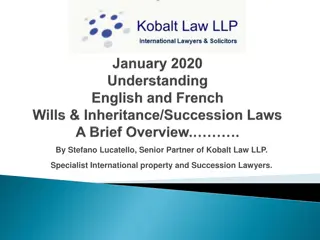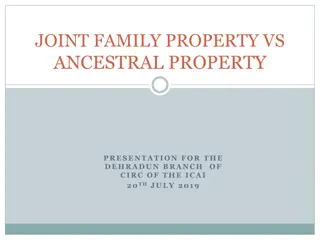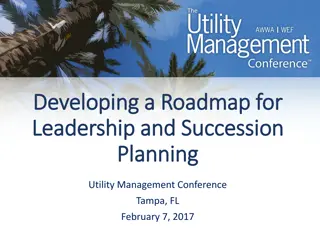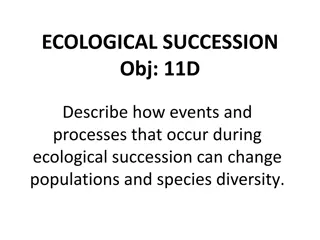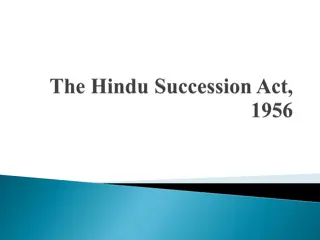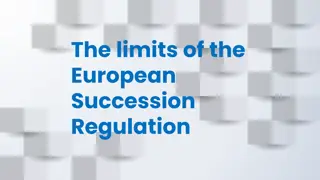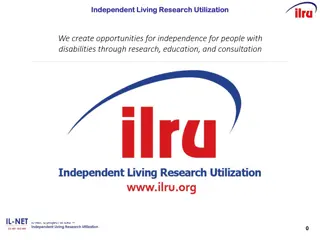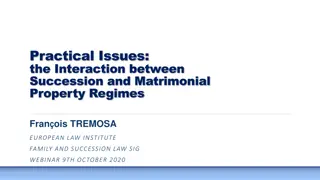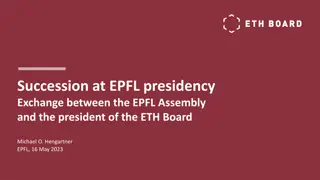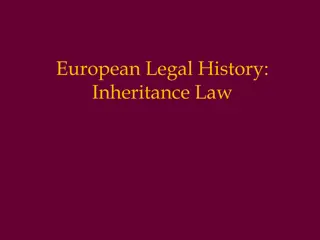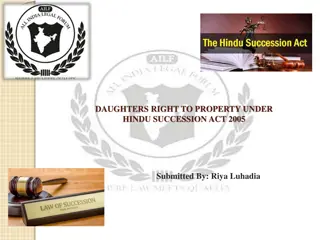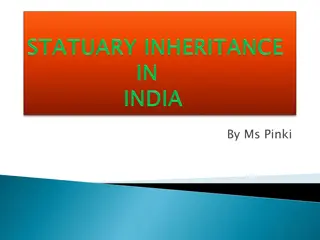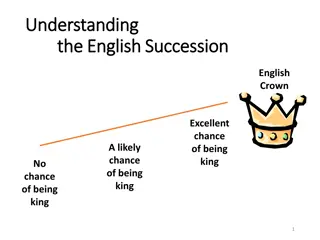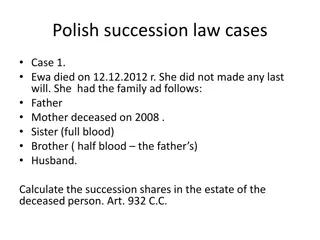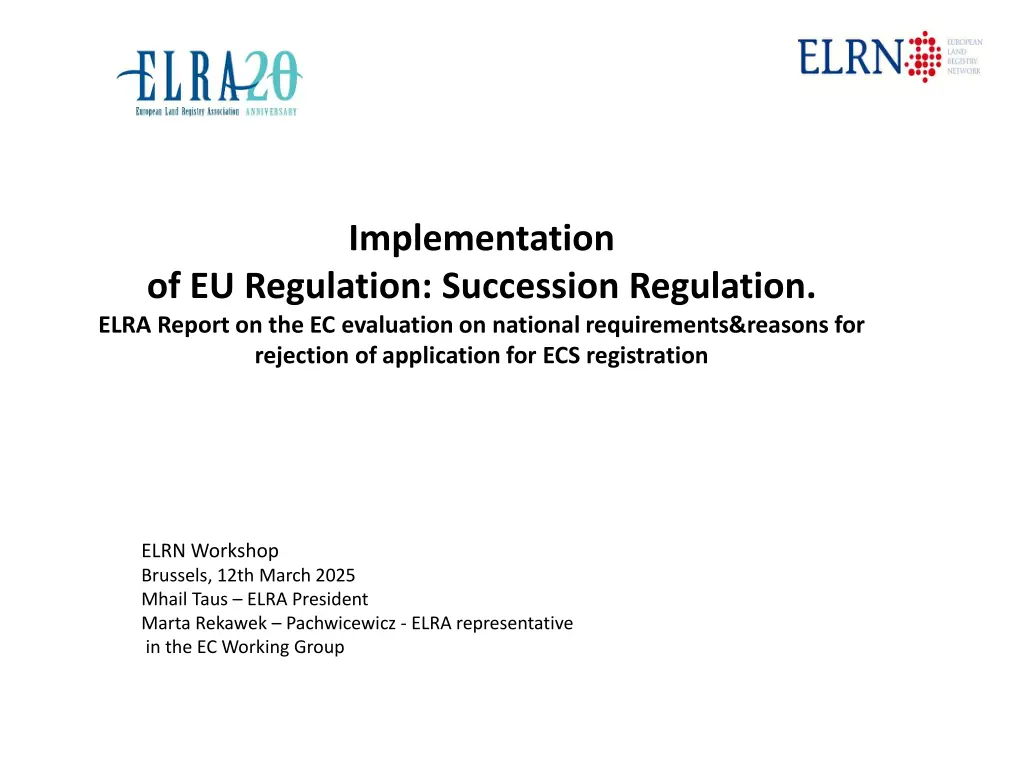
European Succession Regulation: ELRA's Insights and Contributions
Dive into the world of European Succession Regulation through ELRA's reports and workshops. Discover the intricacies of national requirements, rejection scenarios, and the path to successful registration under the EU framework. Join the discourse on jurisdiction, applicable law, recognition, and enforcement, culminating in the creation of a European Certificate of Succession.
Download Presentation

Please find below an Image/Link to download the presentation.
The content on the website is provided AS IS for your information and personal use only. It may not be sold, licensed, or shared on other websites without obtaining consent from the author. If you encounter any issues during the download, it is possible that the publisher has removed the file from their server.
You are allowed to download the files provided on this website for personal or commercial use, subject to the condition that they are used lawfully. All files are the property of their respective owners.
The content on the website is provided AS IS for your information and personal use only. It may not be sold, licensed, or shared on other websites without obtaining consent from the author.
E N D
Presentation Transcript
Implementation of EU Regulation: Succession Regulation. ELRA Report on the EC evaluation on national requirements&reasons for rejection of application for ECS registration ELRN Workshop Brussels, 12th March 2025 Mhail Taus ELRA President Marta Rekawek Pachwicewicz - ELRA representative in the EC Working Group
EJN Working Group Succession Law ELRA s Contribution New document: Conclusions of the results of the survey of ELRN Contact Points on Regulation (EU) No 650/2012 of the European Parliament and of the Council of 4 July 2012 on jurisdiction, applicable law, recognition and enforcement of decisions and acceptance and enforcement of authentic instruments in matters of succession and on the creation of a European Certificate of Succession, additionally to the European Commission Questionnaire Working Group Succession Law established at the European Judicial Network (EC). ELRA s Working document. Brussels, 16th December 2024
EJN Working Group Succession Law ELRA s Contribution ELRA's research on national requirements to register rights on real estate in a cross- border context: detailed ELRN survey, written responses submitted by 19 ELRN member organisations and addressed the actual state of play in a total of 18 Member States, i.e. Austria, Bulgaria, Cyprus, Estonia, Finland, Hungary, Ireland, Italy, Latvia, Lithuania, the Netherlands, Poland, Portugal, Romania, Spain, Slovakia and Sweden, practical issue presented in Question 8.2 analysed in relation to registration practice in the Member States and the relationship between: EU law (the Regulation) vis. national law (lex rei sitae v. lex registrationis)
EJN Working Group Succession Law ELRA s Contribution
EJN Working Group Succession Law ELRA s Contribution Table illustrates and gives solution: registration requirements of each Member State what should be included in the European Certificate of Succession in any of its part (Annex V) the inclusion of this information should be displayed as an additional field in the ECS (Annex V), combined with the information coming from the individual national orders e.g. on the e-Justice portal or in another user-friendly form (e.g. an annex to the instructions on the form, instruction on an ECS)
EJN Working Group Succession Law ELRA s Contribution Practical example of ECS which would be registered in LR of Austria (1) and Poland (2): 1. Austria: it should contain information about identification of assets, identifications of all heirs, identification of shares for each heir, valid copy, validation of issuer and legal translation, but the additional issues as additional documents and tax document are not required, there is not mandatory registration and constitutive effects. 2. Poland: information about identification of assets, identifications of all heirs, identification of shares for each heir, valid copy, validation of issuer, legal translation and mandatory registration, but the additional issues as any additional documents and tax document are not required, there is no constitutive effects.
EJN Working Group Succession Law ELRA s Contribution Survay to Question 8.1 - identification the most common mistakes/ deficiencies made in applications for registration of a right in the land register using ECS as the basis for entry.
EJN Working Group Succession Law ELRA s Contribution
EJN Working Group Succession Law ELRA s Contribution Conclusions of ELRA s Report the subject of the ECS and the information contained and the legal effects gives rise to it also in the sphere of registration of rights to immovable property ECS should be explored in greater depth, in terms of both the popularity and its problematic nature study on effect of ECS by registration would have ensured the smooth use of this instrument it is a pity that there is not yet a central register of ECS issued the e-Justice Portal plays a very important and positive role in this respect, but it is not always sufficient succession law is very diverse in the EU Member States, so it is important to have a proper understanding of the type and consequences of succession actions
EJN Working Group Succession Law ELRA s Contribution Conclusions of ELRA s Report trans-national information concerning the properties, forming part of the estate should be collected, analysed and completed, what will help to prevent problems of entry in the land register ECS plays an important role in the legal process of registering the right to real estate in the national land registers the great diversity of national law requirements in the area of land registrations, due to different legal traditions and histories - the principle of lex rei sitae linked to the law of a particular register it is important that the ECS captures information that considers national specificities information from the CPs of the Member States made available on the e-Justice Portal will help issuing authorities to individualise a specific ECS across borders.



